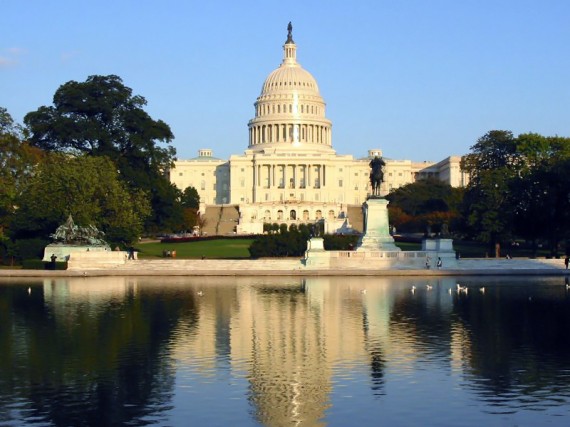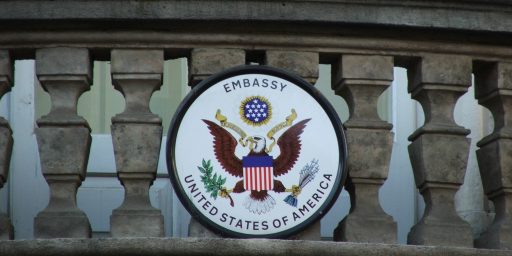Confirmation is the Weakest Aspect of Oversight
There really is no reason for Congress to confirm so many posts.
 To expand on a comment that I left in Doug Mataconis’ post on the large number of executive positions, I would note that of the oversight powers that Congress has, confirmation is one of the weakest (indeed, I am not even sure it is properly defined as “oversight” as much as it is simply a check on the president’s power). This is especially true of the hundred and hundreds of relatively obscure positions that no one is really paying much attention to in the first place.
To expand on a comment that I left in Doug Mataconis’ post on the large number of executive positions, I would note that of the oversight powers that Congress has, confirmation is one of the weakest (indeed, I am not even sure it is properly defined as “oversight” as much as it is simply a check on the president’s power). This is especially true of the hundred and hundreds of relatively obscure positions that no one is really paying much attention to in the first place.
Now, I am speaking here of appointments to executive positions and not to courts. At a minimum, the lifetime tenure of judges changes the basic equation in those appointments. Further, it makes sense in our separation of powers system that both of the other branches would have a role to play in populating the third (rather than leaving that power in the hands of only one other branch).
When it comes to executive appointments, however, we are talking neither about lifetime tenure, nor are we talking about populating an independent branch of government. We are talking about the elected executive populating the executive branch for a finite amount of time. Most of the appointment we are talking about here have a maximum term of four years.
As a side note, there are certainly appointed positions, such as to the Board of Governors of the Federal Reserve System, which serve longer terms and are invested with independent powers that fall into a different category and for which I am not targeting this conversation.
I will accept, for the sake of discussion, that an argument can be made that the heads of the cabinet level agencies ought to go before Congress as a check on the president, although I am open to an argument that even that process is not necessary. However, for the sake of this discussion I am thinking about everything below the top level of appointees.
The issue at hand is oversight of executive activity and whether Congress needs confirmation power as a means of overseeing the executive bureaucracy. In his post, Doug stated the following:
The reason that Congress has defaulted to making the positions of new agencies that it may create, of course, is that it allows that body to retain oversight control over the body itself from the very beginning by requiring that the Senate have a voice in determining who gets to staff those agencies. Ceding authority for appointment of new members to the President essentially means that the agency becomes a creature of the President.
But here’s the deal: vetting the occupant of a given position does not provide oversight power over the operation of that position. In other words, the behavior of the person once in office is by no means guaranteed because Congress approved said person.
Oversight is about the ongoing operation of the bureaucracies in question. Indeed, the oversight powers that Congress has over the components of the executive branch are budgeting and legislating. Ever dollar spent by the federal government is ultimately controlled by the Congress and every action of the federal government is controlled by laws passed by Congress (save the specific actions derived from the constitution, and even those are mostly applied via legislation).
The ability to say yes or no on a specific appointee (especially at lower levels) really doesn’t give Congress much much actual oversight power over the appointee in question. Further, once appointed they serve at the pleasure of the President, not of the Congress (even if some could potentially be impeached, not that that is going to happen).
Mostly the confirmation process is faux oversight at best, if it really can be defined as oversight at all. It is certainly easier than real oversight.
I would argue that, without a doubt, we require far too many positions to be approved by Congress. It really serves no real purpose apart from making it a slow and difficult process to populate the positions of office.






Clipped from the other thread you mention:
You know…if you really want to talk about oversight…why aren’t you guys previewing the IRS hearing on Capitol Hill today?
Issa has been trying his damndist to blow up scandals where there are none: Fast and Furious, Solyndra, Benghazi, Joe Sestak…the list is long. Today, if there is any justice, he will get his hat handed to him over the non-existent IRS scandal. This so-called Republican has been wasting scads of the people’s time and money on witch-hunts and political theater.
So yeah…let’s eliminate the Congressional approval on a bunch of positions. I’m all in favor of smart Government and that would certainly be smart governing.
But the smartest thing we could do is get partisan cowboys like Issa under control.
I have never thought of confirmation as oversight.
One thing that I envy in the American political System are precisely confirmations. Here in Brazil, specially at the State and City level, there are too many inappropriate people being nominated to top posts.
@Andre Kenji: Confirmation hearing at the state level in the US are typically only done for non-elected Agency/Department heads, who then populate their agencies / departments as they see fit. Sometimes they will be done for trustees or regents of things like Transportation Districts or University Systems, but even there, often they Governor will get to appoint a portion of the Board, the Legislature will get to appoint a portion, and the remainder come from stakeholders or the community at large.
At the local level, I don’t know that confirmations are done at all. If they are, it is rare. Positions are generally either elected by tiny slivers of the voting population, or the local government’s CEO’s office runs around begging people to volunteer to sit on boards.
No reason for Congress to confirm SO many posts! SO many! Are you kidding me? Do you know how many they have blocked? The numbers are staggering compared to other administrations! Congress is a joke and their mission is clear, it has been from day one of the Obama presidency. Deny, deny, deny! Deny all appointments and don’t go along with anything that would move the country forward. Who cares about the country? They have a sole purpose in life and that is to deny Obama any meaningful progress on anything. The country is sick of them but they are so dense they don’t see it in their wonderful poll ratings of which really should be 0% by now. Republicans have never been a party for the people. They are the party of power as that is all they long for. The people and their wishes are the last thing they care about!
The question is, replace it with what? If we get rid of the confirmation process, executive branch positions wouldn’t be vetted at all. There would be nothing standing in the way of Jacksonian-style patronage. We talked about this with regard to ambassadors, and in that case I thought that the current system is effective, probably more effective than having ambassadors who don’t have the president’s ear. But for the executive agencies, there has to be some kind of oversight of staffing decisions.
@Pinky: The patronage system was one in which the entirety of the federal government was basically fired after each administration left and populated with the allies of the president. That was the spoils system that predated the creation of the professional civil service.
@Pinky: @Steven L. Taylor: I’ve argued in the past that we should replace it with a civil service system. That is, most of the posts now appointed by the president and confirmed to the system would instead be filled by career professions from the Senior Executive Service, Senior Foreign Service, and Senior Intelligence Service ranks.
@James Joyner: Such a move makes a lot of sense.